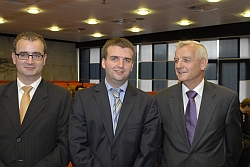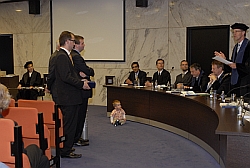Broad technology standards are beneficial to all
 Geerten van der Kaa has defended his PhD thesis entitled <link erim events _blank>“Standards Battles for Complex Systems; Empirical Research on the Home Network” on May 26.
Geerten van der Kaa has defended his PhD thesis entitled <link erim events _blank>“Standards Battles for Complex Systems; Empirical Research on the Home Network” on May 26.
Have you ever tried to play movies directly from your computer on your television? To accomplish this, you will have to connect your computer to your television and that sounds easier than it actually is. Take a few moments to look at the available ports on a laptop and try to find similar ports on a television and you are in for a big surprise; the two technologies are incompatible. Why is there no USB port on hardly any television set - or an HDMI port on a computer? To make all of our lives simpler, a choice will have to be made between the different possible standards. But then again, which of these standards would be the best choice?
There are indeed many so-called standards battles that have been fought over the years such as the classical battle between VHS, Betamax, and V2000 in the 1970s and 1980s and the more recent battle between Blu-ray and HD-DVD. In these cases, several companies suffered severe losses.
In his PhD dissertation entitled “Standards Battles for Complex Systems; Empirical Research on the Home Network”, Geerten van de Kaa argues that if companies would work together, and ensure to develop standards, more companies will benefit eventually. Indeed, the market support will be bigger as more markets can be combined in a large network. In his dissertation, he develops a framework which will enable companies to explain and predict the outcome of such standards battles. By developing this framework for standard dominance and applying it to three historical case studies, Van de Kaa composed a checklist for developing a company strategy for standards battles. This checklist consists of 29 factors divided in 5 categories. The factors have been weighted by leading experts. The case studies were analysed in cooperation with Philips.
“However”, Van de Kaa emphasizes, “standards should not be too ‘standard’, a certain flexibility must be maintained. When a standard is more flexible, the network of actors that support the standard can become more diverse and vice versa. As a consequence, the dominance of the standard itself increases.”
This research adds to both standardization and (social and interorganisational) network literature in two ways: first, by integrating different streams of literature into a framework consisting of factors for standard dominance that is more complete than existing frameworks; second, by focusing on the influence of networks of actors on standard selection.
 About Geerten van de Kaa:
About Geerten van de Kaa:
Geerten van de Kaa was born on 28 March 1979 in Breda, the Netherlands. He received his secondary education diploma from the Katholieke Scholengemeenschap Etten-Leur in 1998. From 1998 to 2003, Geerten studied Informatics and Economics at Erasmus University Rotterdam. After his studies, he was an IT consultant at Impuls IT, a software company in Dordrecht and later he was an application manager at B&S International, a wholesale company in Dordrecht. In 2004, he started a PhD project on standardization for home networks. This project was conducted at the department of Management of Technology and Innovation of Rotterdam School of Management, Erasmus University between October 2004 and September 2008. During this time Geerten taught a bachelor course and he supervised master students. Geerten’s research spans the areas of strategic management of technological innovation, standards and dominant designs, and social networks.
Geerten has presented his work at leading international conferences such as the Academy of Management Annual Meeting, Hawaii International Conference on Computer Sciences, International Product Development Management Conference, and the International Conference on Standardization and Innovation in Information Technology.
From 2004 until 2008 he was a member of the B@Home project and of the larger Freeband program which was coordinated by the Telematics Institute. Freeband Communication is a Dutch national research program aiming to create a leading knowledge position for the Netherlands in the area of ambient, intelligent communication. Together with other people he was responsible for the research conducted on home networking standards. He has both published and presented several white papers in the project. In October 2008, he started working as an Assistant Professor of Strategy and Innovation at Delft University of Technology.
Abstract:
Home networks combine components and technologies from the consumer electronics industry, the information technology industry, the telecommunications industry, and the home automation industry. Irrespective of the fact that the home network has been technically possible for many years, it has not become a practical reality. A major reason is the lack of generally accepted common standards.
In this dissertation we develop a framework with which we can explain and predict which standard will have the highest chance of achieving dominance. We applied the framework to several standards battles and it appeared that it can be used to explain these standards battles better, when compared to existing frameworks in the literature. We applied a multi-attribute utility approach to standard selection and provide a first indication of weights for factors. Also, we have studied two factors in depth: the diversity in the network of actors that support a standard; and the flexibility of the standard. We provide a first indication that these variables influence standard dominance positively and reinforce each other.
More Information
Pictures of the Defense
Full Text of the Dissertation


